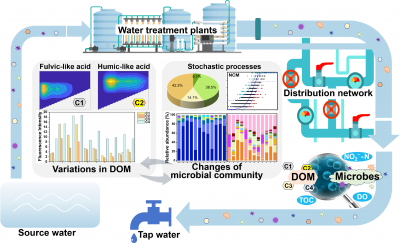A recent study has highlighted significant insights into how variations in dissolved organic matter (DOM) influence the stability of microbial communities within drinking water supply systems. This research, focusing on multi-source water supply systems, indicates that the characteristics of DOM can affect the microbial richness and community structure from the source to the tap.
The findings reveal that in these water supply systems, DOM exhibits weak humification alongside strong autochthonous sources. This means that while some organic matter is naturally occurring, it does not undergo significant transformation into more complex forms as expected. Furthermore, the study shows that water treatment processes actively reduce microbial richness, altering the community structure in the process.
Key Findings on Microbial Dynamics
One of the pivotal elements of the research is the identification of stochastic processes that drive the assembly of microbial communities. These processes highlight the randomness involved in which organisms thrive in the water supply, influenced by the specific conditions present in each system.
The study also emphasizes the role of fulvic-like and humic-like acids, which are essential components of DOM. Variations in these acids provide critical insights into the mechanisms that govern microbial stability. As such, understanding these components is vital for effective monitoring and management of drinking water systems.
Another significant aspect of this research is its implications for public health and water management policies. With microbial communities being crucial for water quality, the alterations caused by treatment processes could have far-reaching effects. This underscores the importance of continuous monitoring and adjusting treatment methods to maintain microbial stability.
As global water resources face increasing pressures from pollution and climate change, findings like these are essential for developing more effective water treatment strategies. The research serves as a reminder of the complexity of drinking water systems and the need for ongoing studies to ensure safe drinking water for all.
In summary, the study sheds light on the intricate relationship between DOM and microbial communities, providing a foundation for future research and practical applications in water management. Ensuring the stability of these communities is crucial for protecting public health and maintaining the integrity of drinking water supplies worldwide.







